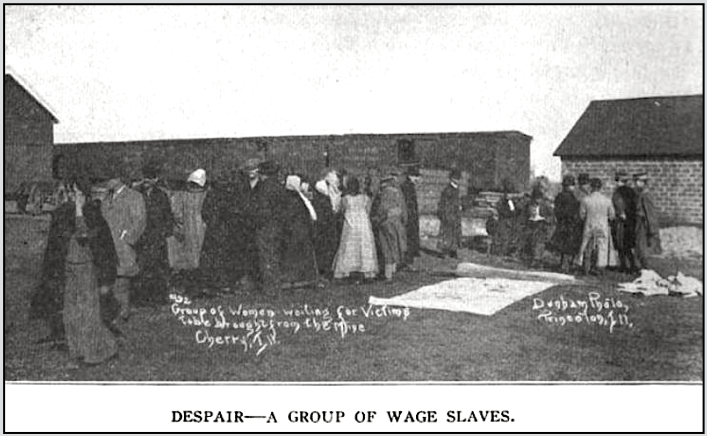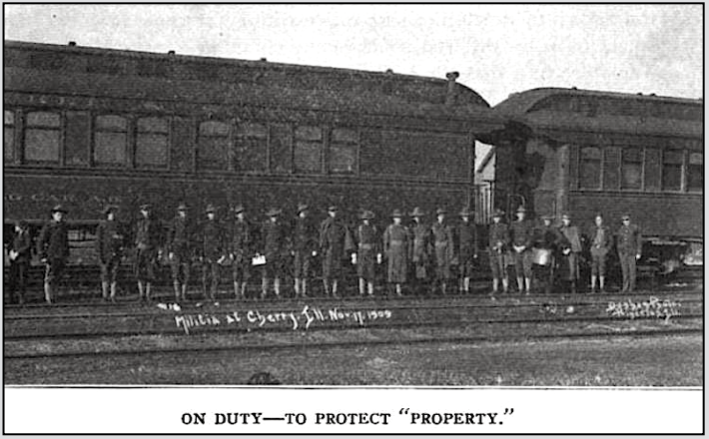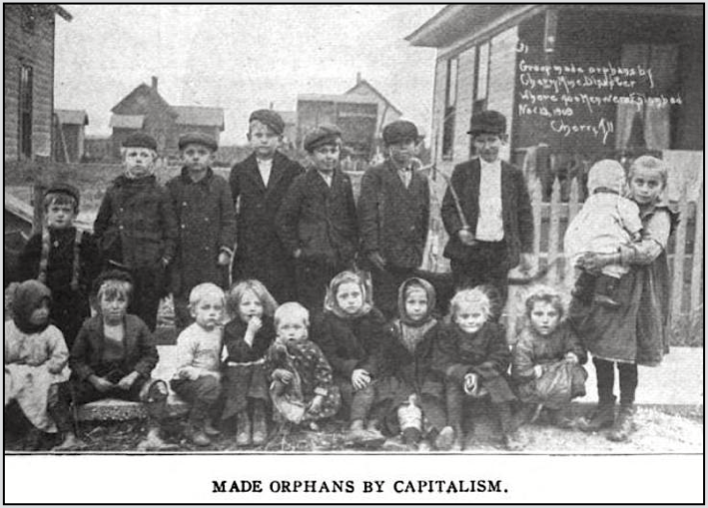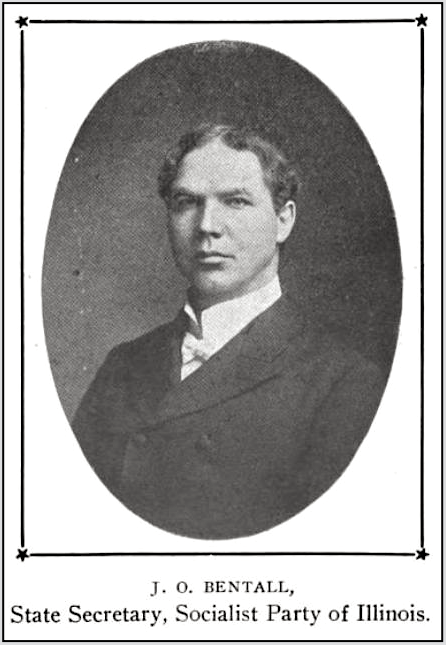 ———-
———-
Hellraisers Journal – Saturday January 8, 1910
Cherry, Illinois – Scene of Mass Murder of Men and Boys, Part II
From the International Socialist Review of January 1910:
The Cherry Mine Murders.
—–Why Four Hundred Workers Were Burned and Suffocated
in a Criminal Fire Trap.
—–By J. O. Bentall.
—–[Part II of II.]
Little Albert Buckle, 15 years old November 28, who escaped on the last car up, and his mother and sister stood at the ropes all day watching for “Rich,” who was 16 years the 21st of last June, and who had worked in the mine ever since his father was killed three years ago, but poor Richard was not brought up that day. On Monday I went to see the broken-hearted mother but I could not comfort her.
At one time we were told by “Inspector” Taylor that real work was to be done. Twenty of us were at the bottom of the mine ready to take orders and go ahead.
Taylor laid fine plans. “I will put five or six of you in charge of Mr. Jones. Another company will go with Mr. Smith. Two or three will go with me. The rest will be stationed as follows.”
A fine plan was outlined. We felt good. Everybody was ready and it actually seemed as if we were to accomplish something. But all at once, after this elaborate schedule which had consumed over an hour, “Inspector” Taylor turned to us very pleasantly, saying:
“Now, gentlemen, you have been down here quite a while and it would be well for you all to go up to get a lunch. Then we will carry on the work we have outlined.”
Of course there was nothing to do but to go up and get a lunch. It is needless to say that Taylor never got back to the boys to execute the plan.
But we went up to lunch. Yes, for ten days we had gone up to lunch every six or eight hours. It was hard work to wander around in the mine. We needed fresh air and material to make blood and muscle out of.
The lunch room was in the company’s boiler room. There were two pieces of flooring sixteen feet long on some old boxes wiggling on a pile of gas pipes and iron carelessly scattered from the repair corner. Facing us as we sat down was a “table” made up of three pieces of flooring on two empty salt barrels. At the end of the table was a dirty gasoline stove on top of which was a precarious-looking wash boiler with coffee.
On the “table” were two dozen tin cups, a paper box with sugar, a tray of ham sandwiches and two spoons. Three “visiting nurses” were between us and the table who handed sandwiches and coffee to the volunteer rescuers. One nurse at each end of the line would start to stir the coffee for the men and when they met in the middle with the two spoons held high in the air they would call out:
“Are you all stirred?”
“Yes, we are all stirred,” I told them, “mightily stirred. Have they only two spoons over in the Pullman cars also?”
“Oh, there are lots of spoons over there, but they are for the officials,” was the reply.
After twelve days the best the company could do was to furnish the volunteers with sandwiches, coffee and two spoons. This was our food. They also furnished lodging.
Yes, in the night when we were too tired to go down another trip we tried to find a spot to rest. The firemen had been made to “double up” in the Pullmans, but the berths thus made available were for sale at such a figure as to make it impossible for the volunteers to sleep in these comfortable bunks.
So we just found some old paper and spread it on the brick-paved floor of the boiler room, selected a chunk of coal on which we also placed a piece of paper and used it for a pillow.
And we were fairly comfortable—more so than the men in the mine, who were walled in to keep from the black damp and who were suffering the agony of death-like suspense waiting for their rescuers, that were held back by the iron souls of the company’s officials.
We were told that the Red Cross Society was taking care of the hungry in Cherry. Thousands of dollars have been given to this fake society, of which W. H. Taft, President of the United States, is president. This society can be forgiven for its total neglect of the rescuers. The society for prohibiting cruelty to animals would, however, have declared it outrageous to feed men on only one kind of food for a long time, especially when they are working as the volunteers were.
“The Red Cross” could not see this fearful wrong. Nor could this Red Cross—rather Red Graft, this bloody hypocrite of the capitalist hydra—discover any need among the people bereft of husbands and brothers, starving in their hovels. I went around to a great number of homes and asked how their needs were supplied. Most of them had been helped by kind neighbors, none by the Red Cross. The only beneficiaries of the Red Cross seemed to be the soldiers and the nurses, who were having a high time flirting and carousing, while the hungry women and children in Cherry were the least possible concern to the Red Graft.
Had it not been for the neighbors and some farmers, as well as the little Congregational church, whose basement was given over to the charity workers, the women and children of the murdered miners would have suffered from starvation even the first and second week. I brought this criminal neglect on the part of the Red Cross Society to the notice of several prominent people, but my story was not believed. I pointed out how the Red Cross had utterly failed to pay any attention to the awful distress of the bereaved, but everybody had faith in this national organization in spite of the fumblings it has been guilty of from the catastrophe in San Francisco to the Cherry holocaust.
Now, after a month of suffering, when the wail and cry of the cold and hungry can no longer be smothered, the daily papers are compelled to show up the real situation.
But in spite of these facts, Graham Taylor, D. D., a minister and professor in the Chicago Theological Seminary, member of the Illinois Mining Investigating Committee, writes an article in “The Survey,” lauding the Red Cross, the “inspectors” and company, bluffing the people into the belief that the hundreds of thousands of dollars given to the Red Cross are judiciously spent, when he knows or ought to know that scarcely a drippling has actually gone to the real sufferers.
And just now Alderman Scully, of Chicago, who has been to Cherry and seen the situation, demands that the public funds given to the Red Cross be turned over to the Miners’ Union, as the Red Cross has proven itself wholly incapable, having placed its orders in the hands of unscrupulous merchants who charge 25 cents a pound for the poorest kind of meat and in every other way demand exorbitant prices, leaving people in utmost destitution.
This Red Cross Society is what Graham Taylor calls “an experienced agency which commanded the confidence of the local and outside communities.”
One little farmer woman, Mrs. Anna N. Kendall, living a few miles from Cherry, did more all alone in providing needed clothing for the babies, that were being born while their fathers were carried out of the black pit, and for two hundred other little ones yet to be born into the world fatherless, than all the Red Cross Society with its large retinue of officers and salaried relief experts has done during the entire period of distress in Cherry. She is the real charity heroine in the Cherry disaster.
Had the miners’ union been in shape to take hold—to demand possession of the situation—from the start the workers could have been brought out alive with very few exceptions, and the immediate wants of those who had lost their bread winners could have been filled systematically and efficiently.
But this wholesale murder of workers, with the subsequent outrages on the patience and long suffering of their relatives and the people in general, with the spiriting away of witnesses and the frustration of justice, forces upon the toilers a new reason why we should unite and take into our own hands the industries of the world and put within reach the elements necessary to the life and progress of the whole human race.
———-
[Emphasis and paragraph break added.]
~~~~~~~~~~~~~~~~~~~~~~
SOURCES & IMAGES
Mother Jones Quote, Life Cheaper Than Props, Trinidad CO, Sept 16, 1913,
-fr Hse Com Exhibit 105, p2630
https://play.google.com/books/reader?id=92IvAQAAMAAJ&printsec=frontcover&pg=GBS.PA2630
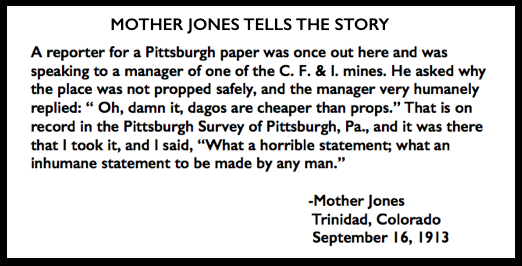
The International Socialist Review, Volume 10
(Chicago, Illinois)
-July 1909-June 1910
C. H. Kerr & Company, 1910
https://books.google.com/books?id=MVhIAAAAYAAJ
ISR – Jan 1910
-“The Cherry Mine Murders” by J. O. Bentall
https://play.google.com/books/reader?id=MVhIAAAAYAAJ&printsec=frontcover&pg=GBS.PA577
Part II
https://play.google.com/books/reader?id=MVhIAAAAYAAJ&printsec=frontcover&pg=GBS.PA582
See also:
Tag: Great Cherry Mine Disaster of 1909
https://weneverforget.org/tag/great-cherry-mine-disaster-of-1909/
Note: I could not find “dagos/dagoes are cheaper than props” in any volume of The Pittsburgh Survey:
https://catalog.hathitrust.org/Record/001345845
However, the quote was found from 1913, see:
https://babel.hathitrust.org/cgi/ls?field1=ocr;q1=%22dagos%20are%20cheaper%20than%20props%22;a=srchls;lmt=ft
Re use of this quote by Mother Jones, see:
Mother Jones Speaks
-ed by Philip S. Foner
Monad Press, 1983
(search: dagoes)
https://books.google.com/books?id=T_m5AAAAIAAJ&dq=editions%3AGkwGKDyGyuMC
Page 182: Speech at Montgomery WV on Aug 4, 1912
Page 202:Speech at Charleston WV on Aug 15, 1912
-(from transcript of operators’ spy, and can also be found in Senate Investigation of Paint Creek Conditions, see below.)
Page 230: Speech at Trinidad CO on Sept 16, 1913
-taken from Proceedings of Special Convention of District 15 UMWA
-(Also see speech above from Operators Exhibit 105 of House Investigation-some differences. And I must say that I would go with ops transcript as they often hired very expert stenographers to spy on Mother Jones.)
Page 375: Washington, DC, Apr 23, 1914, Mother Testifies bf House of Representatives Subcommittee of the Committee on Mines and Mining Investigating Conditions in the Coal Mines of Colorado.
Conditions in the Paint Creek District, West Virginia, Hearings Before a Subcommittee of the Committee on Education and Labor, United States Senate, Sixty-third Congress, First Session, Pursuant to S. Res. 37, a Resolution Authorizing the Appointment of a Committee to Make an Investigation of Conditions in the Paint Creek District, West Virginia -June 2-Oct. 29, 1913
-See page 2270
https://play.google.com/books/reader?id=R1U-AAAAYAAJ&printsec=frontcover&pg=GBS.PA2270
~~~~~~~~~~~~~~~~~~~~~~~~~~~~~~~~~~~~~~~~~~~~~
The Mannington Mine Disaster – Hazel Dickens
How can God forgive you, you do know what you’ve done.
You’ve killed my husband, now you want my son.

